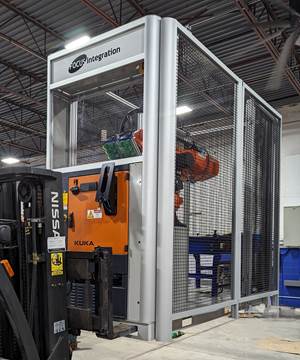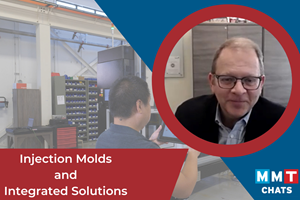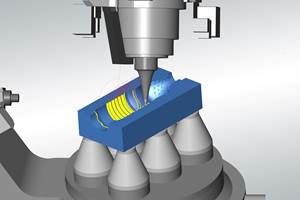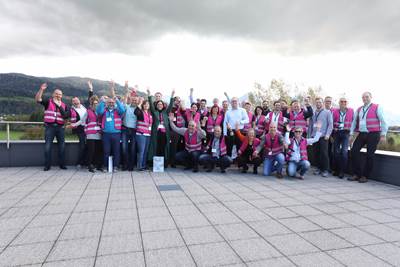Where the Alps meet the Mediterranean and the Pannonian Plain meets the Karst, there is Slovenia. Bordered by Austria, Italy, Croatia and Hungary, this small green country extends in the area of 7,827 square miles. It is one of the countries with an exceptional number of top athletes and rich cultural creation. And the Slovenians love their wine; there is a vineyard for every 70 people, or so it is claimed.
Slovenia also prides itself with having the highest number of tool and moldmakers per capita in Europe. With a population of two million, the Slovenian toolmaking industry employs around 3,500 people in 170 companies that generate an estimated accumulated revenue of 400 million euros. According to Tecos, the Slovenian Tool and Die Development Center, the tool and moldmaking industry is one of the country’s key industry sectors, led by small- to medium-sized moldmakers for the injection molding industry, followed by medium to large companies in the metal forming and die making industry as well as low- and high-pressure castings.
“Exporting around two-thirds of our products, our toolmakers have some key advantages,” Dr. Aleš Hančič from Tecos says. “They are positioned in the vicinity of most of their main customers in bordering European countries. The companies are characterized by high adaptability and responsiveness, as well as a good technical culture and tradition in toolmaking.”
Traditional Family Business
One of these “typical” small- to medium-sized mold shops with a tradition in toolmaking is Bizjan Orodjarstvo d.o.o., a second-generation family business. Founded in 1982 by Janez Bizjan as a part-time business, his son Robert took over in 1993 and has been heading the tool and moldmaking business ever since. Today, the company employs 10 people and exports about half of the injection and blow molds to the European market, mainly Germany, Austria, France and the Netherlands.
“After finishing my training as an engineering technician, I worked as an intern in a turning shop in the mornings, helping my dad in his company in the afternoon,” Robert Bizjan says. “I was attracted to the toolmaking profession as it a highly-complex job and requires a lot of precision. In 1992, when the Yugoslav market collapsed, many larger companies went bankrupt and the unemployment rate was high. For us, it was the right time to grow the business, so I took it over from my father and made Bizjan a full-time moldmaking business.”
In 1994, Bizjan had his first employee, but unless companies don’t train their (future) staff on the job, there are not many skilled people (who have already completed an apprenticeship) to find in Slovenia, he says. “Here, near Slovenia’s capital Ljubljana, dual education and training courses are hard to find. All of our new employees came straight from school and had to learn their skills here on the shop floor. The lack of a proper apprenticeship scheme here in Slovenia is a huge problem.”
Other challenges shops like Bizjan face is competition from low-cost countries, sometimes insufficient capacities to undertake larger projects, high labor costs, liquidity problems, lack of government support and a lack of research capabilities. As a result, many companies not only in toolmaking but in metalworking cooperate in clusters, professional associations, universities and research institutes, supporting fundamental and applied research that address technological barriers facing the industry.
Bizjan is no exception; the company closely cooperates with Tecos for mold flow simulations and the elimination of any potential problems with the mold before its production. Through its scientific and technological knowledge, Tecos helps tool and moldmakers with tool design and evaluation, warpage compensation in injection molds, mold inspection and reverse engineering as well as staff training.
Development of a Self-Regulating Injection Mold
In a joint effort, Tecos and Bizjan have initiated the FlexMould project, a co-funded development project within the scope of the Slovenian Smart Specialization Strategy S4, an operational plan facilitating the shift to a high-productivity economy.
“With the FlexMould project, we aim to develop a self-regulating injection mold for polymer materials, which is capable of changing cavities during production through an autonomous regulated actuator system,” Hančič explains. “The system ensures that molders can produce small series of different products or variants of the same product without changing the mold in the machine to increase productivity. A rotating mold insert distributes the plastic material to different cavities, so the injection molding machine produces several different plastic parts with one mold, which can then be assembled.”
While Tecos is responsible for the mold concept and the design of demo part, testing, project management as well as technical and financial reporting, Bizjan is the hands-on project partner to produce the mold with its actuator system.
After several investments in state-of-the-art equipment over the last couple of years, Bizjan is certainly the right partner for such a project. The company produces around 50 multi-cavity molds per year with a weight of up to two tons mainly for the PET bottle, caps and closures industry.
“Thanks to our ongoing investments in five-axis machining centers, automation and the latest CAD/CAM software, as well as quality control, we manage to grow our business every year,” Bizjan says. In 2014, he invested in his first five-axis machining center, an Okuma MU-400VII and upgraded his Mastercam CAM software with a five-axis module. “Okuma helped us train our best CNC operator on five-axis programming and machining, who then shared his knowledge with our other operators.”
“To be able to operate on the same or even more competitive level over the next five years, we need to continually invest in new machines and employ one or two more people.”
The latest investment is a DMG Mori Ecoline CNC turning machine. Since space is restricted in the small company’s production area, Bizjan had to be inventive and decided to install the Ecoline together with other turning equipment in the building’s cellar. But a freight lift and air-conditioning ensure a good work environment. To ensure a high quality standard, an in-house coordinate measuring machine is used for all critical parts, which are exclusively assembled in-house.
“In order to remain competitive and to continue delivering the same or even higher quality molds to customers in Germany, for instance, we have to continuously invest in new equipment, automation know-how and, of course, qualified staff; due to lower labor costs here in Slovenia, we have been able to compete in high-cost markets in Europe, but labor costs are on the rise and we have to become even better.”
As a result, Bizjan is currently installing tool and workpiece handling systems from Schunk and 3R to accelerate workpiece changeovers on the company’s three- and five-axis machining centers. Inserts with conformal cooling is common practice, some of them made by metal laser sintering. Moreover, Bizjan strongly believes in the importance of a transparent and accountable business culture and to maintain a strong employer and employee relationship, which is key to success because people are more productive, more efficient, create less conflict and are more loyal.
“To be able to operate on the same or even more competitive level over the next five years, we need to continually invest in new machines and employ one or two more people,” Bizjan says. “Therefore, we are trying to buy an adjacent property to expand our capacities; that’s the only way forward in an increasingly cost-competitive business environment.”
For More Information
Related Content
Compact Robotic Palletizer Easily Automates Packaging Process
The Cube cell, complete with a KUKA KR50-R2500 robot, is targeted for small- and medium-sized businesses looking to automate the palletization of their end product.
Read MoreScholle IPN Merges With SIG to Deliver Sustainable Packaging
By joining forces, the companies plan to offer a more comprehensive range of sustainable packaging solutions.
Read MoreInjection Molds and Integrated Solutions Through Ambition and Innovation
Jordan Robertson, VP, Business Development and Marketing for StackTeck discusses various mold technologies to improve efficiencies in automation, cooling, lightweighting and sustainability.
Read MoreCustomized CAM Strategies Improve Five-Axis Blow Mold Machining
The proper machining process and workflow can impact blow mold production, making your CAM software selection critical.
Read MoreRead Next
Four European Countries in Three Days
The German Association of Tool and Mould Makers‘ (VDWF) networking event for young entrepreneurs took around 40 moldmakers on a three-day trip around Lake Constance in October 2017 to visit OEMs and innovative mold shops in Germany, Austria and Switzerland.
Read MoreMoulding Expo Goes Slovenia
Themed “Tool & Pattern & Mold & You”, the third edition of Europe’s leading moldmaking show will take place from May 21-24 2019 at the Stuttgart show grounds in Germany. For Slovenian tool and moldmakers, MEX is the most important industry event, which is why the country recently played host for the MEX 2019 international press conference.
Read MoreHow to Use Continuing Education to Remain Competitive in Moldmaking
Continued training helps moldmakers make tooling decisions and properly use the latest cutting tool to efficiently machine high-quality molds.
Read More


.JPG;width=700;quality=80)
.JPG;width=860)
.JPG;width=860)
.JPG;width=860)
.JPG;width=860)
.JPG;width=860)
.JPG;width=860)
.JPG;width=860)

.JPG;maxWidth=150;quality=70)





.png;maxWidth=300;quality=90)













.jpg;maxWidth=300;quality=90)





.JPG;maxWidth=400;quality=70)

